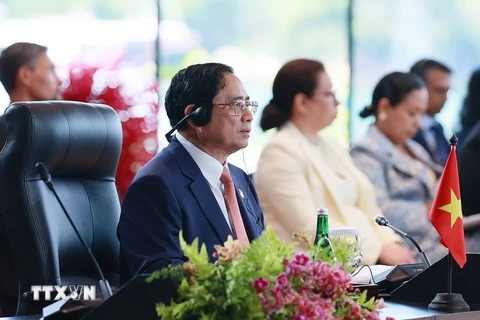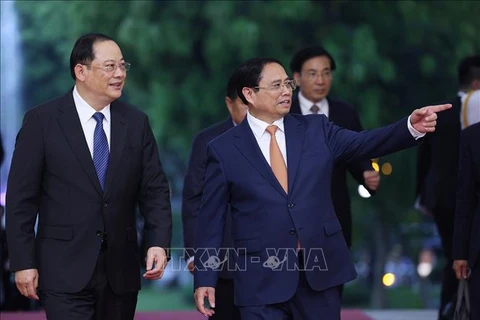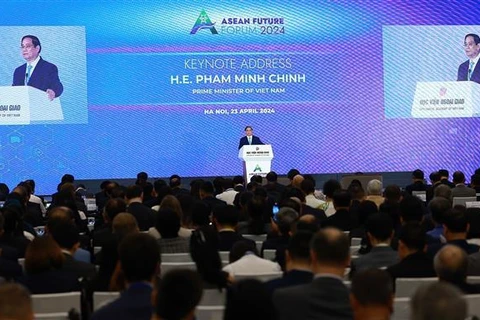Hanoi (VNA) - Prime Minister Pham Minh Chinh on April 23 proposed breakthrough orientations to make ASEAN a model in digital transformation globally, while co-chairing a business roundtable with his Lao counterpart Sonexay Siphandone in Hanoi.
Chinh stressed the importance of equal access to digital transformation and digital economy on the principle of "harmonising benefits and sharing risks"; ensuring transparency, safety, inclusiveness, and sustainability; strongly promoting ASEAN's self-reliance and autonomy in digital transformation, based on specific factors, potential and advantages of each country; and soon completing the ASEAN Digital Economy Framework Agreement.
He suggested promoting a global, all-people, and comprehensive approach in ASEAN's digital economic development; and focusing on solving common and global problems that affect the entire population such as pressure on labour restructuring, cybersecurity, cybercrime, and the downside of artificial intelligence (AI).
The Vietnamese leader also urged countries, partners, and the ASEAN business community to strengthen cooperation in digital transformation to contribute to renewing traditional growth drivers, and promoting digitalisation associated with the application of science and technology in industries and fields to create new growth engines.
It is also necessary for the parties to intensify cooperation and support in financial resources, knowledge, technology transfer, and human resources training so that ASEAN and Vietnam can participate more deeply in frameworks, mechanisms, and supply chains in the region and the world, added Chinh.
He told participants that Vietnam determines national digital transformation and digital economic development on the basis of science, technology and innovation as a strategic development orientation by 2030, with a consistent viewpoint of putting people and businesses at the centre, and considering them as subjects, targets, driving forces, and important resources of digital transformation.
As a result, the country has gained important achievements in digital transformation, including an average digital economic growth rate of around 20% a year, the complete building of the National Population Database, and over 80% of its population using the Internet.
Vietnam hopes the ASEAN business community, investors, and partners to enhance cooperation, companionship, and support in promoting priority areas in digital economic development, he added.
Lao PM Sonexay Siphandone emphasised the need for closer cooperation between businesses and private sectors with governments of countries and between countries to make the most of the benefits and overcoming the challenges brought about by digital technology.
At the roundtable, participants exchanged views on opportunities and challenges in digital economic collaboration in ASEAN, proposed measures to boost cooperation between the bloc and its partners in this field, and recommended the formation of an ASEAN digital economic ecosystem.
They also discussed the application of AI in corporate governance, digital transformation in the information sector, cooperation in building high-quality digital human resources, and how to improve the investment environment to attract high-tech investment.
President, Asia Pacific at Google Scott Beaumont advised ASEAN to invest in infrastructure, human resources, and research and development, and in building data centres. He also stressed the need for ASEAN countries to ensure a strong enough legal environment, and ensure investors achieve their set goals./.
Chinh stressed the importance of equal access to digital transformation and digital economy on the principle of "harmonising benefits and sharing risks"; ensuring transparency, safety, inclusiveness, and sustainability; strongly promoting ASEAN's self-reliance and autonomy in digital transformation, based on specific factors, potential and advantages of each country; and soon completing the ASEAN Digital Economy Framework Agreement.
He suggested promoting a global, all-people, and comprehensive approach in ASEAN's digital economic development; and focusing on solving common and global problems that affect the entire population such as pressure on labour restructuring, cybersecurity, cybercrime, and the downside of artificial intelligence (AI).
The Vietnamese leader also urged countries, partners, and the ASEAN business community to strengthen cooperation in digital transformation to contribute to renewing traditional growth drivers, and promoting digitalisation associated with the application of science and technology in industries and fields to create new growth engines.
It is also necessary for the parties to intensify cooperation and support in financial resources, knowledge, technology transfer, and human resources training so that ASEAN and Vietnam can participate more deeply in frameworks, mechanisms, and supply chains in the region and the world, added Chinh.
He told participants that Vietnam determines national digital transformation and digital economic development on the basis of science, technology and innovation as a strategic development orientation by 2030, with a consistent viewpoint of putting people and businesses at the centre, and considering them as subjects, targets, driving forces, and important resources of digital transformation.
As a result, the country has gained important achievements in digital transformation, including an average digital economic growth rate of around 20% a year, the complete building of the National Population Database, and over 80% of its population using the Internet.
Vietnam hopes the ASEAN business community, investors, and partners to enhance cooperation, companionship, and support in promoting priority areas in digital economic development, he added.
Lao PM Sonexay Siphandone emphasised the need for closer cooperation between businesses and private sectors with governments of countries and between countries to make the most of the benefits and overcoming the challenges brought about by digital technology.
At the roundtable, participants exchanged views on opportunities and challenges in digital economic collaboration in ASEAN, proposed measures to boost cooperation between the bloc and its partners in this field, and recommended the formation of an ASEAN digital economic ecosystem.
They also discussed the application of AI in corporate governance, digital transformation in the information sector, cooperation in building high-quality digital human resources, and how to improve the investment environment to attract high-tech investment.
President, Asia Pacific at Google Scott Beaumont advised ASEAN to invest in infrastructure, human resources, and research and development, and in building data centres. He also stressed the need for ASEAN countries to ensure a strong enough legal environment, and ensure investors achieve their set goals./.
VNA
























